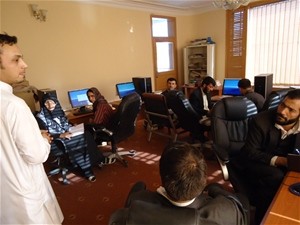
Nine judges and 11 staff members of the Anti-Corruption Tribunal attend a USAIDprovided computer training program and learn how to apply their knowledge to fight corruption in Afghanistan.
USAID/RLS-Formal
The Anti-Corruption Tribunal learns the advantages of using technology in judicial work
26 APRIL 2011 | KABUL, AFGHANISTAN
A recent annual perception survey ranks Afghanistan as the second most corrupt country in the world, with only Somalia ranking worse. Despite this reputation, Afghan governmental officials are making efforts to reduce corruption. This has included the Afghanistan Supreme Court establishing the country’s first Anti-Corruption Tribunal.
In support of this Afghan-led effort, USAID recently donated six computers and implemented a 20-hour training program to build the capacity of the tribunal judges and staff on using computers to support the tribunal’s work. The training focused on basic computer skills, including Microsoft Word® and Excel®, and methods of Internet research. The trainees learned about the benefits of tracking cases electronically, drafting and circulating virtual bench orders, and using the Internet for case research.
Before the training, the tribunal’s official case register consisted of a datebook with handwritten case information and orders, and decisions tracked in hard-copy format. Such archaic and informal recordkeeping was wreaking havoc on the tribunal president’s ability to assign cases to appropriate panels of judges, manage case flow, and strategically administer court processes. For example, there were limited ways to readily determine the most basic court administration information at any given time, such as the number of cases on the docket.
Despite the obvious benefits, trainees also had to overcome the psychological hurdles posed by a lack of proficiency with computers. Before the training, the tribunal president hesitated about using his laptop. However, now the tribunal president, judges, and staff have begun to use their newly acquired skills. The tribunal president boasts about a case register on an easily accessible electronic database, giving him the ability to assign cases to panels with appropriate technical expertise and to communicate with other judges in day-to-day work. He noted, “I have even learned to access e-mail. I am proud of adopting a system that will enhance transparency and accountability within the court for Afghan people.”
USAID’s Afghanistan Rule of Law Stabilization — Formal Component project is designed to develop the human and institutional capacity of the justice sector, increase access to justice, particularly for women, and increase public demand for rule of law.







Comment
Make a general inquiry or suggest an improvement.